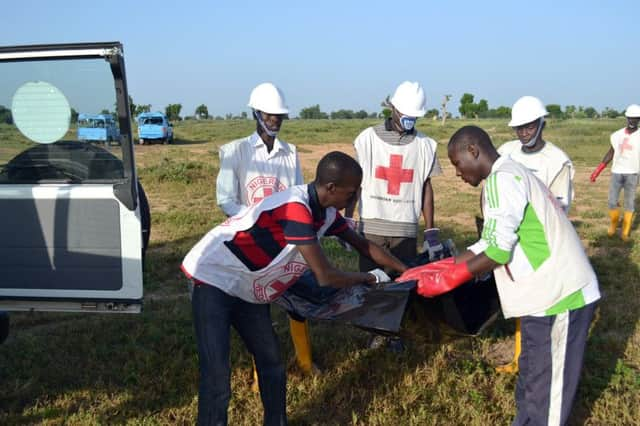Nigeria: 4 women suicide bombers in dawn bloodbath


The explosions happened at dawn, just hours after two bombs exploded near a mosque in Maiduguri, killing at least 30 people.
The agency’s north-east Nigeria coordinator, Muhammed Kanar, said 20 people were wounded in that earlier attack, some critically. Boko Haram Islamic extremists are suspected of being behind the attack.
Advertisement
Hide AdAdvertisement
Hide AdThe series of suicide bomb attacks comes even as President Muhammadu Buhari says that he expects the “final routing of Boko Haram as an organised fighting force” by the year’s end.
Nigeria’s army chief indicated a major offensive is imminent.
“The next few days will be crucial,” he said in a message to troops. “Our ability to stand and defeat the Boko Haram terrorists in the next few weeks will determine the future of our country ... (whose) sovereignty as a nation is threatened.”
But with Maiduguri having been attacked four times this month alone, fresh questions will be asked about security in the city, where Boko Haram, which is allied to the Islamic State group in Syria and Iraq, was founded in 2002.
One area of the city, Ajilari Cross, has been hit three times in a month, killing more than 120. There have also been suicide attacks near the capital, Abuja.
Overall, some 1,350 people have been killed since Buhari came to power at the end of May, according to a tally yesterday.
Guerrilla-style tactics against “soft” civilian targets such as mosques, markets and bus stations have increased.
Last week, 41 people were killed in triple explosions in Baga Sola, on the Chadian side of Lake Chad, where Nigeria meets Niger, Chad and Cameroon. Yesterday Nigeria’s most senior army officer, Chief of Army Staff Lieutenant General Tukur Buratai, told troops “the next few days will be crucial” in the counter-insurgency.
Advertisement
Hide AdAdvertisement
Hide Ad“It is also crucial to our country, Nigeria. Our sovereignty as a nation is threatened. The Nigerian Army and indeed the military as the symbol of our nationhood is being challenged.
“Our ability to stand and defeat the Boko Haram terrorists in the next few weeks will determine the future of our country. We cannot afford to lose the fight,” he said.
The greater sense of urgency may be attributed to fears of a resumption of attacks in hard-to-reach rural areas of northeast Nigeria once the rainy season ends.
Should that happen, troops attempting to secure towns and cities would face overstretch to tackle the Islamists in the countryside, which Boko Haram controlled last year.
A US presence in northern Cameroon could help boost intelligence efforts to thwart planned attacks across the Lake Chad region. But the repeated attacks on Maiduguri have demonstrated the difficulties in combating the threat to urban areas.
Yesterday’s attack in Umarari, a village of mainly poor farmers and labourers some 4.5 miles west of Maiduguri, also happened at a mosque shortly after 5am.
Witness Dawud Baana said worshippers were preparing for morning prayers at the time.
Street vendor Saratu Garba said she heard the blast as she was carrying firewood out of her house and that 19 were killed.
Boko Haram has a track record of attacking mosques, considering places of worship that do not share its radical interpretation of Islam as a legitimate target.